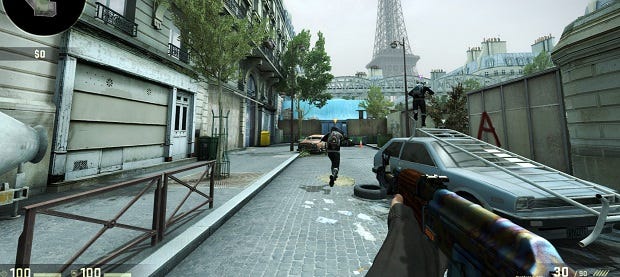Wot I Think: CS GO - Operation Vanguard
Valve demands heavy ransom
A recent study by the PEW Internet Project exposed the blindingly obvious hypocrisy of most people's attitudes towards online services. We don't want our privacy compromised, we don't think big companies can be trusted with our data, and the power of corporations like Google makes us uncomfortable. But despite all these deeply-held and very serious fears, billions of people still use the products involved. So too with DLC in all forms. We bitch and moan, mock the price on twitter, talk about how far games have fallen – and then pony up the dough when nobody's looking. Counter-Strike: Global Offensive's new Operation Vanguard is what we've let ourselves in for.
Counter-Strike: Global Offensive is the current iteration of Valve's top-in-class competitive shooter, and the first to be maintained in the very modern way it has been. Learning from its experience with Team Fortress 2, Valve has a miniature economy in CS: GO that revolves entirely around gun decals. Players get a few 'drops' a week after matches, which can be a gun decal or a weapon crate – the latter of which cost £1.49 to unlock with a one-use key from the store. Obviously this economy is tailor-made, and so there are extraordinarily rare and mysteriously fantastic-looking gun and knife skins (with prices in the hundreds of pounds), then a large range of other skins tapering down to the common-as-muck variety that trades for pennies.
I don't pay much attention to the CS: GO economy as a whole, though it's interesting enough, but it's important for a non-player to understand that a big chunk of the game's audience takes it very seriously indeed. In the days after a new Operation launches countless forum threads are launched about the value of the new goods, whether someone should sell this new rare drop they got or hold it for a while, Twitch streams with giveaways and 50 crates being unlocked and so on. You get the picture.
I give such context on CS: GO's economy because – even though it is a subsidiary part of the game to many including myself – it is the molten core of Operation Vanguard. CS: GO is a regularly-patched game but the major updates come in the form of Operations that introduce new maps and new skins, at the price of around £3 for an access pass – with the nice touch that maps are available to all players regardless, or made so shortly afterwards.
To give an exhaustive history of Operations would be no more useful than a general overview. If you play Counter-Strike then the chances are you play a lot of Counter-Strike. What the Operations do is freshen things up a bit – naturally they don't disrupt the regular Dust-Mirage-Inferno cycle of competitive play, but you get some unfamiliar environments to tool about in, the chance to score some fancy new weapons, and in the context of a game you play almost daily, £3 a few times a year is chicken feed.
Operation Vanguard is different, and the changes are not for the better. The first problem I have with it is major: the way it's sold seems to skirt the borderline of deception. To participate in Operation Breakout you bought an 'All-Access Pass' for £2.39. To participate in Operation Vanguard I bought an 'Access Pass' for £2.39. The difference is obvious side-by-side, but of course when OV popped up in Counter-Strike's home menu I bought it more or less instantly, thinking this was the same thing.
OV's selling point is two 'campaigns,' a series of missions with three branching paths. The missions are things like 'Win 16 rounds on map X' and 'Kill 20 chickens in Deathmatch mode,' and completing one bags a pre-determined award – either a weapon crate or a random weapon from a specified collection. So far, so OK. But in fact OV has two more campaigns, both of which cost £1.79 to access – which follow more or less the same pattern.
To be crystal-clear about this, the money is not the problem. I'm happy to pay for Operations, and OV's combined total of around £6 in the context of the time I put into Counter-Strike is really not an issue. But that switch from 'All-Access Pass' to 'Access Pass (with the right to buy more access)', just pissed me right off.
First of all I felt conned. I bought the OV pass in the same way I'd bought all the previous Operation passes, expected it to be the same deal, and realised I'd been fooled by the removal of 'All.' Secondly, what the two 'extra' purchases offer is basically a re-skinned version of OV's mission book. But thirdly, and this is the real killer, you're encouraged to buy them to self-medicate the most egregious, enormous, climactically wrong and frankly offensive design decision in Vanguard.
There are multi-day cooldowns on missions. That's right Rambo, you may have thought you were buying another set of missions and drops to liven up day-to-day business in CS: GO, but in fact Vanguard is a campaign designed to play out over a set period of time, with the only limiting factor a bald external one: cooldown timers.
Let me set the scene for you. I love Counter-Strike. I saw Vanguard was out on a Thursday, and cleared Friday night. Got in a few beers. Booted it up and bought the pass. I played the first mission, cleared it in about 15 minutes. Chose a second, the killing chickens one, and that was another 15 mins. So around half an hour into my evening of joy I was given a four-day cooldown for the next mission.
You can slice this any way you want, but it's bullshit. The sad thing is I get the thought process behind it. Consider: you're Valve, in charge of a game where players (a) want new content but (b) put in so many hours that they'll rush through anything almost instantly. For example, mission chains. Operation Breakout introduced missions in the form of random drops, which parcelled them out over time but had no larger arc. It was fine but the missions never felt... important. So Operation Vanguard's missions are in structured patterns, with defined rewards, and are given the desired longevity through simple brute force of timing. You will not complete this content before we say so, because you can't.
Oh, except that if you buy the extra mission packs, your cooldowns decrease across the board, because now you're allowed to do more missions in a set period. That's right. You're basically paying to reduce cooldowns. In a Valve game.
The thing is that Operation Vanguard is only a 'campaign' in the same way that a pile of biscuits is 'lunch.' The missions are basic objectives like 'Win 16 competitive rounds on Season' or 'Get 100 FAMAS kills in Deathmatch mode.' And what do you get for completing them? Either a drop from an existing collection of guns, with a minor chance of a rare gun, or a weapon crate. The first is fair enough, but the second... I mean, at this point I already felt pretty rinsed by Operation Vanguard, and now it's 'rewarding' me with crates that I need to pay more money to open.
There is a school of thought that says Valve has done this in order that a flood of new crates and mission rewards doesn't flood the in-game economy, instead trickling them in over the coming months. To that argument the only appropriate response is – who cares? I play Counter-Strike: GO because it's a great game, I don't play it because of the economy, and while I accept the latter is how Valve makes money, the moment it starts intruding into the game – if indeed this explanation holds water – then the economy is not acting in the way that it should. That is, it should be improving the experience rather than throttling it.
The sad thing is that Operation Vanguard comes with my favourite selection of community maps yet, including two in Season and Back Alley that feel like potential classics. Yeah they're all over the place in terms of favouring one side or the other, but this is par for the course with CS: GO and will be tweaked over the coming months. Every CS: GO operation freshens the game up with some new environments if nothing else, and the point of Operation Vanguard's structure is to elongate this beyond a few days – to really showcase these excellent maps by forcing people to play on them semi-regularly for missions. It at least manages this.
I want to emphasise that I'm an enormous fan and committed player of CS: GO, with over 500 hours logged in the past year. I watch the big pro games, I play with friends, I buy crate keys regularly, and I even dabble in a few illicit activities on the side. Point is that I'm used to spending money and time on this game in possibly-unwise quantities. CS: GO is fabulous and the Operations do a great job of pulling you back in after little lulls. I think Valve is one of the best developers and stewards of games on the planet.
But Operation Vanguard is sold in a manner I can't quite forgive – there's nothing quite like feeling a trusted game has betrayed you. I don't resent the money. I don't mind the missions, they're nice enough, though the attempt to dress them up as a 'campaign' is overly optimistic. I don't even care that the best part of Operation Vanguard is free for players who didn't pay.
What I hate is that Operation Vanguard shows a clear path for the future of CS: GO and that is, along with the recently-introduced 'music packs,' a mercenary attitude towards its growing and dedicated playerbase. Like everyone else I'm a hypocrite, of course, so I'll keep on playing and I'll probably spend more money in the future. But who knows how long that will continue? Because Operation Vanguard has taken one of my favourite games and, for the sake of a few pennies, made me love it just that little bit less.














